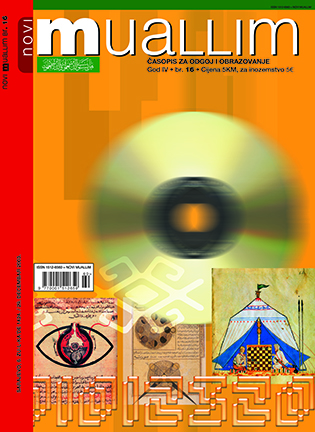THE SPIRITUAL PROFILE OF AN IMAM IN THE MODEM SOCIETY
DOI:
https://doi.org/10.26340/muallim.v4i16.1520Abstract
This article points out to a difference between a profession and a calling. A professionalism, with all its advantages (qualifications, quality of work, etc.), has its limitations since it's often characterized by plodding through a job, which lacks an important humanistic motivation. A person who stays within the limits of a profession is wary of everything that's out of his occupation. A calling, on the other hand, means inner excitement, enthusiasm, self-fulfillment, etc. Undoubtedly, the spiritual profile of an Imam in the modem society also includes this other dimension, but the accent is on a calling, which not only does not exclude profession, but, to the contrary, it comprises it. The role of an Imam in a society is thoroughly analyzed. The authority of an Imam is, in a certain way, eroded or is at least restricted to particular segments of a society. This, of course, does not have to be at the expense of his religious dignity and influence, which are to a great extent dependant on the level ofhis spiritual development. Two types of authority are examined: official authority, which can be claimed based on a position in a society and personal authority, which is based on the characteristics that give him certain power and influence over others. Also given are types of the intellectual involvement, that mutatis mutandis, can be applied to Imarns; the restrained intellectual and the neutral technician, the enthralling romantic or the one who views society from the standpoint of universal values, the involved creator, fiilled with critical charge or the one who views society critically, always rediscovering more reasonable and more humane ways. Also, certain functional roles expected of Imams are given:
a) liturgical role of presiding in various forms
b) socio-spiritual role of overseeing spiritual and liturgical organizations
c) educational role of overseeing religious schools and learning from a pulpit
d) community role of establishing relationship with the followers, both on individual and a community level; related to this is a citizen role manifested through an intluential person in the community and an official representative of a religious community.
Downloads
Published
How to Cite
Issue
Section
License
Naknada:
a. Časopis ne naplaćuje naknadu za obradu članaka (APC) i naknadu za podnošenje članaka.
Autori koji objavljuju u ovom časopisu pristaju na sljedeće uvijete:
- Autori zadržavaju autorska prava i pružaju časopisu pravo prvog objavljivanja, pri čemu će rad jednu godinu po objavljivanju biti podložan licenci Creative Commons imenovanje koja omogućuje drugima da dijele rad uz uvijet navođenja autorstva i izvornog objavljivanja u ovom časopisu.
- Autori mogu izraditi zasebne, ugovorne aranžmane za ne-ekskluzivnu distribuciju rada objavljenog u časopisu (npr. postavljanje u institucionalni repozitorij ili objavljivanje u knjizi), uz navođenje da je rad izvorno objavljen u ovom časopisu.


